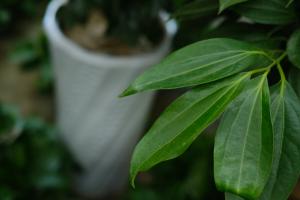How to Trim an Agave Plant
Agave plants are popular ornamental plants that are usually grown in arid and semi-arid regions. These plants are often known for their tough and spiky leaves that can be a little intimidating to handle. However, it is important to trim agave plants regularly to maintain their shape and prevent them from becoming overgrown. In this article, we will guide you through the process of trimming an agave plant.
Step One: Gather Your Tools
Before you begin trimming your agave plant, it's important to make sure you have the right tools on hand. You will need a good pair of pruning shears, a small hand saw, a pair of gloves for protection against the plant's sharp spines, and a rake or leaf blower to clean up the debris.
Step Two: Identify the Dead or Damaged Leaves
Start by examining your agave plant and identifying any dead or damaged leaves. These leaves can often be identified by their brown or yellow color or wilted appearance. Dead or damaged leaves should be removed from the plant to prevent the spread of disease or pests.
Step Three: Trim the Dead or Damaged Leaves
Using your pruning shears or hand saw, carefully cut away the dead or damaged leaves at their base, as close to the stem as possible. Make sure to wear gloves to protect your hands from the plant's sharp spines.
Step Four: Thin Out the Overcrowded Leaves
Agave plants can easily become overcrowded if they're not properly trimmed. Remove any leaves that are rubbing against each other or overlapping. This will help to improve air circulation and reduce the risk of disease.
Step Five: Cut Back the Flowering Stalk
Most agave plants send out a flowering stalk after several years of growth. If your plant has started to flower, it is important to trim the stalk back to prevent the plant from expending all its energy on the flowers. Use your pruning shears or saw to cut the flowering stalk back as close to the stem as possible.
Step Six: Clean Up
Once you have finished trimming your agave plant, it's important to clean up any debris on the ground. Use a rake or leaf blower to remove any cut leaves or branches from around the plant.
In conclusion, trimming an agave plant can be a little daunting, but with the right tools and a little patience, it can be done easily. By following these simple steps, you can ensure that your agave plant remains healthy and attractive for years to come. Remember to wear gloves to protect your hands from the plant's sharp spines, and always be careful when using sharp tools. Happy trimming!

 how many times do yo...
how many times do yo... how many planted tre...
how many planted tre... how many pine trees ...
how many pine trees ... how many pecan trees...
how many pecan trees... how many plants comp...
how many plants comp... how many plants can ...
how many plants can ... how many plants and ...
how many plants and ... how many pepper plan...
how many pepper plan...































